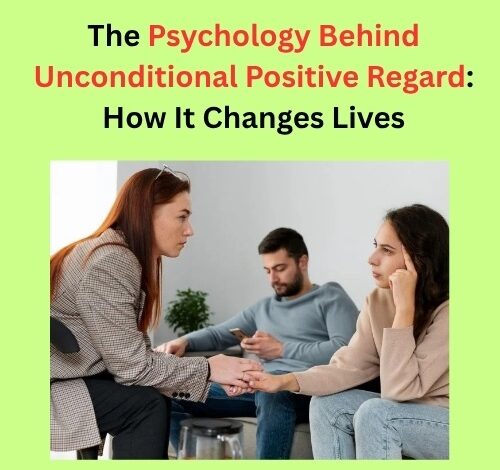The Psychology Behind Unconditional Positive Regard: How It Changes Lives

Unconditional Positive Regard (UPR) is one of the most transformative concepts in psychology, capable of reshaping relationships, fostering self-growth, and empowering individuals to realize their full potential. Coined by renowned psychologist Carl Rogers, UPR is a foundational element in person-centered therapy and has far-reaching applications well beyond the therapist’s office.
The psychology behind Unconditional Positive Regard, the science supporting its efficacy, how it can transform lives, and practical ways to integrate it into everyday interactions.
What Is Unconditional Positive Regard?
At its core, Unconditional Positive Regard means accepting and valuing someone without judgment, regardless of their thoughts, feelings, or behaviors. It involves recognizing the inherent worth of every human being and offering support that is not contingent upon specific actions or attributes.

Carl Rogers and the Birth of UPR
The concept of UPR originated in the mid-20th century with Carl Rogers, one of the most influential psychologists of his time. Rogers developed person-centered therapy as an alternative to the more authoritarian and directive methods prevalent in psychotherapy.
He proposed that for people to grow and achieve self-actualization, they need an environment characterized by:
- Congruence (genuineness)
- Empathy (understanding from the other’s perspective)
- Unconditional Positive Regard (non-judgmental acceptance)
Of these, UPR is often considered the most radical and transformative. It calls on therapists—and people in general—to look beyond behavior and circumstance to affirm the inherent worth of another person.
The Psychology Behind UPR: How It Works
Humanistic Foundations
UPR is deeply rooted in the humanistic psychology movement, which emphasizes:
- The inherent goodness of people
- The drive toward growth and fulfillment
- The importance of subjective experience
Rogers believed that many of the emotional struggles people face result from conditional positive regard—when love, approval, or acceptance is contingent upon meeting certain standards. Over time, individuals internalize these conditions, developing a “conditional self-worth.”
By contrast, UPR helps dismantle these internalized conditions, enabling people to experience genuine acceptance. This fosters authenticity, self-compassion, and ultimately, psychological well-being.
The Role of the Self-Concept
At the heart of UPR’s power lies its effect on the self-concept—the organized set of beliefs and perceptions one holds about oneself.
Conditional Positive Regard and the “False Self”
When acceptance is conditional (e.g., “I’ll love you if you succeed”), individuals often suppress or distort aspects of themselves to maintain approval. They may present a “false self”—one that conforms to external expectations but is misaligned with their true feelings and values.

UPR and the “True Self”
In an environment of UPR, individuals feel safe to explore and express their authentic selves. They no longer need to hide imperfections or seek constant validation. This enables a process called self-actualization, in which they become more aligned with their true nature and values.
Neurobiological Underpinnings
Modern neuroscience provides additional insights into why UPR is so transformative:
- Attachment and Safety: UPR activates the social engagement system (ventral vagal complex), promoting feelings of safety and connection. This state is optimal for learning and growth.
- Neuroplasticity: Positive relational experiences, especially those involving consistent acceptance and empathy, promote neuroplastic changes that reshape brain circuits related to self-worth and resilience.
- Stress Reduction: UPR reduces activity in the amygdala (the brain’s fear center), calming stress responses and enabling clearer thinking and emotional regulation.
How UPR Changes Lives: Real-World Impact
1. Promoting Self-Acceptance
Perhaps the most immediate and profound effect of UPR is that it fosters self-acceptance. When individuals experience unconditional acceptance from another, they often begin to internalize this acceptance and extend it to themselves.
Case Example
Consider a client in therapy who struggles with intense shame over past mistakes. In an environment of UPR, the therapist communicates that the client’s worth is not diminished by these errors. Over time, the client may learn to view themselves with greater compassion and understanding, reducing shame and promoting healing.
2. Encouraging Authenticity and Growth
UPR creates a space where people can:
- Explore new aspects of themselves
- Take emotional risks
- Pursue goals aligned with their values
Without the fear of rejection, individuals are more likely to experiment with new behaviors, express genuine emotions, and develop a more integrated self-concept.
Example in Relationships
In personal relationships, UPR might mean accepting a partner’s vulnerabilities without trying to change them. This encourages deeper intimacy and trust, allowing both partners to grow together.
3. Enhancing Mental Health
Numerous studies have shown that therapeutic relationships characterized by UPR are linked to:
- Reduced anxiety
- Decreased depression
- Improved self-esteem
- Greater overall well-being
UPR provides a corrective emotional experience, especially for individuals who have experienced conditional love or neglect in the past.
4. Improving Parenting Outcomes
Parenting offers one of the most powerful arenas for UPR:
- Children raised in environments of unconditional acceptance are more likely to develop secure attachments and a positive self-image.
- They exhibit greater emotional resilience, creativity, and autonomy.
- They are less prone to people-pleasing or developing a false self.
5. Building Better Workplaces
Leaders who practice UPR with their teams foster:
- Psychological safety, where employees feel free to express ideas without fear of ridicule.
- Increased innovation and collaboration.
- Higher levels of job satisfaction and engagement.
By valuing employees as individuals, not just as performers, leaders can cultivate more humane and effective organizational cultures.
UPR in Action: Principles and Practices
Core Principles
To practice UPR in any setting, certain principles are key:
- Acceptance Without Conditions
Offer acceptance and support regardless of behavior. This does not mean condoning harmful actions, but recognizing that a person’s worth transcends their choices.
- Genuine Empathy
Strive to understand the other’s internal world from their perspective. Communicate this understanding clearly and consistently.
- Non-Judgment
Suspend moral or evaluative judgments. Recognize that everyone is a complex, evolving human being.
- Presence and Attentiveness
Be fully present in interactions. UPR is often conveyed more by tone of voice, body language, and emotional presence than by words alone.
Practical Applications
In Therapy
- Create a Safe Space: Begin each session with an open, non-directive stance. Let clients lead the exploration.
- Respond with Empathy: Reflect feelings and experiences with genuine understanding.
- Avoid Pathologizing: Focus on strengths and inherent worth, not just on “problems.”
In Parenting
- Love the Child, Not Just the Behavior: Communicate love and acceptance even when setting limits or correcting behavior.
- Model Self-Acceptance: Children internalize the way parents treat themselves as well.
- Encourage Authenticity: Support children’s exploration of their interests and identities.
In Relationships
- Practice Active Listening: Give full attention and validate the other’s experience.
- Suspend Judgment: Resist the urge to “fix” or criticize. Offer presence instead.
- Communicate Acceptance: Verbally and non-verbally affirm the other’s worth and humanity.
In Leadership
- Value the Person Beyond Their Role: Recognize employees as whole individuals with lives and aspirations beyond the workplace.
- Foster Psychological Safety: Encourage open dialogue and authentic self-expression.
- Lead with Empathy: Understand and respond to team members’ perspectives and needs.
Challenges and Misconceptions
UPR Is Not Approval of All Behavior
A common misunderstanding is that UPR means condoning all actions. In reality, UPR distinguishes between the person and their behavior:
- One can disapprove of a behavior while maintaining an attitude of unconditional regard for the person.
- This distinction allows for accountability alongside compassion.
UPR Requires Emotional Maturity
Practicing UPR consistently is challenging:
- It requires managing one’s own emotional reactions.
- It calls for deep empathy and the ability to see beyond surface behaviors.
- It demands self-awareness, so that one’s own biases and judgments do not cloud interactions.
UPR Is Not “Soft” or Passive
Some view UPR as weak or permissive. In fact:
- Offering true UPR is an act of profound courage and strength.
- It involves radical acceptance, even in the face of discomfort.
- It fosters authentic dialogue rather than superficial harmony.
Scientific Evidence Supporting UPR
Meta-Analyses of Therapeutic Relationships
Multiple meta-analyses have confirmed that the quality of the therapeutic relationship—including the presence of UPR—is a stronger predictor of therapy outcomes than specific techniques or interventions.
Studies in Attachment and Parenting
- Children raised with consistent acceptance and warmth exhibit more secure attachments, higher self-esteem, and greater psychological resilience.
- Conversely, conditional regard has been linked to greater anxiety, depression, and perfectionism.
Workplace Research
Research on psychological safety—a concept closely related to UPR—shows that:
- Teams with high psychological safety are more innovative and collaborative.
- Employees in such environments report higher levels of job satisfaction and well-being.
Transformational Stories of UPR
Therapy Example: Overcoming Shame
A young man entering therapy felt deep shame about his struggles with addiction. In sessions marked by UPR, he gradually began to trust that his therapist saw him as more than his addiction. This allowed him to confront underlying wounds, rebuild self-worth, and pursue recovery authentically.
Parenting Example: Supporting Identity Exploration
A teenager confided to their parents about questioning their gender identity. The parents, practicing UPR, expressed unconditional love and acceptance. This support enabled the teen to navigate this complex journey with confidence and resilience.
Workplace Example: Leadership Transformation
A manager committed to practicing UPR began having one-on-one check-ins with team members, focused not just on performance but on their personal experiences and goals. Over time, team morale improved, and several employees reported feeling more valued and engaged than ever before.
How to Cultivate UPR in Yourself
- Practice Self-Acceptance
- UPR starts with how we treat ourselves. Cultivate self-compassion and unconditional acceptance of your own imperfections.
- Increase Empathy
- Engage in practices that foster empathy, such as active listening, perspective-taking, and mindfulness.
- Challenge Conditional Beliefs
- Notice where you tend to place conditions on your acceptance of others—and yourself. Work to release these conditions.
- Develop Emotional Regulation
- Strengthen your capacity to manage emotions so that you can remain present and accepting, even in challenging interactions.
Conclusion: The Life-Changing Power of UPR
Unconditional Positive Regard is more than a therapeutic technique; it is a radical way of being that has the power to transform lives.
- It fosters self-acceptance, authenticity, and growth.
- It strengthens relationships, from therapy to parenting to leadership.
- It heals wounds inflicted by conditional love and judgment.
By practicing UPR, we can create environments where people feel safe to be themselves, free to grow, and empowered to reach their full human potential.
In a world too often marked by conditional acceptance and judgment, the practice of UPR offers a powerful counterbalance—a simple yet profound way to make a lasting difference in the lives of others and in our own.




